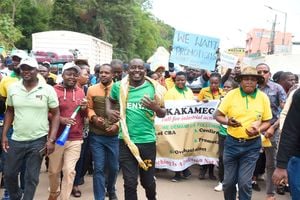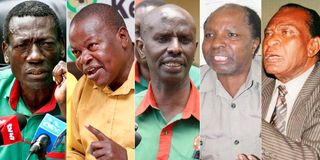
From left: Knut Secretary General Collins Oyuu, Kuppet Secretary General Akelo Misori, former Knut bosses Wilson Sossion, Francis Nganga and Ambrose Adeya Adongo.
The fight between teachers and the government over poor working conditions and demand for a pay rise in Kenya has moulded a love-hate relationship for more than 90 years.
It dates back to 1934 when Eliud Mathu and James Gichuru's attempts to register the Kenya African Teachers' Union (Katu) were rejected by the colonial government, raising teachers' awareness of the need to fight for their rights.
The recent sharp split between the Kenya National Union of Teachers (Knut) and the Kenya Union of Primary Education (Kuppet) over the teachers' strike has only served to highlight the divide and rule tactics used by the government to subdue the unions in their quest for better conditions for their members.
In furtherance of this tactic, the former Kanu government is believed to have unleashed a divide and rule on the teachers by registering Kuppet on 26 November 1998 as an instrument to subdue Knut by cutting off some of its members.
Denial of permits for demonstrations, rejection of teachers' demands for a pay rise by the Teachers Service Commission (TSC), arrests and detention of union officials are some of the tactics used by the government to break the unions and make them toe the line.
It also includes deregistering trade unionists from the Employers' Register of Teachers and financially strangling the unions by not deducting and remitting teachers' monthly dues to the unions, forcing them to hold out begging bowls and retreat in their demands.
While the majority of the current crop of teachers are aware of the spirited fight waged on their behalf by the fiery, respected and fallen Ambrose Adeya Adongo, then Mr Francis Nganga, Mr Wilson Sossion and Mr Collins Oyuu (incumbent), few are aware of the behind-the-scenes engagements in the making and breaking of a strike.
“The history of the formation of Knut, the father and mother of teachers’ trade unions, is engrained in the heart and minds of a fading generation of unionists and retired teachers in the country,” Mr Malel Langat, Knut’s First National Vice chairman, said.
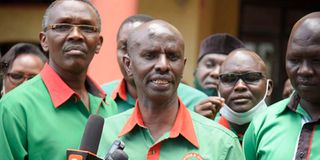
Former Knut Secretary-General Wilson Sossion (centre) with other union leaders address journalists after a past meeting in Nakuru.
Mr Langat said the union's former leaders set the pace in engaging with the employer to improve the conditions of Kenyan teachers, which the current crop of leaders has built on.
Both Kuppet and Knut officials agree that being at the helm, campaigning for teachers' rights and better pay is a delicate balancing act that involves not only throwing punches but also embracing diplomacy.
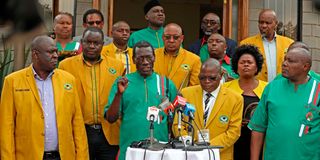
Teachers union officials led by Knut Secretary General Collins Oyuu and Kuppet Secretary General Akello Misori address journalists in Nairobi on August 21, 2024.
“I wish to say that it is easier to start a strike than to end it — it is not a walk in the park” Mr Misori said, referring to the way the union started and ended the strike in an anticlimax for teachers on September 2, 2024.
On fighting from one common front by the unions pushing for almost similar demands to the employer, for teachers, Mr Misori said it was almost impossible and involved betrayal.
“There are cases of treachery and dishonesty of the highest order, but it is granted because we are political formations, anything can happen… Every union has its own mandate to execute” Mr Misori said.
“Engaging in a strike action may look very simple, but coming out of it is very complicated. It is a delicate balancing act between the gains and expectations of the members of the union” Mr Oyuu said.
Mr Oyuu stated, “The question for a leader is whether to take a populist position or do the right thing. In our case, we always choose to do the right thing”
Commenting on Knut's decision to withdraw the strike call and rally the troops to resume classes when schools reopen on 26 August 2024, Mr Oyuu said.
"It is dangerous to continue with a strike in a situation where you have won on important issues against the employer. It is a situation we found ourselves in and had to wriggle out of," said Mr Oyuu.
Mr Oyuu said, “Knut withdrew the strike notice, we did not call off a strike as it had not taken off. That is a misconception that must be corrected,” and added: “Even going for a strike for a day, one must sign a return to work formula with the employer.”
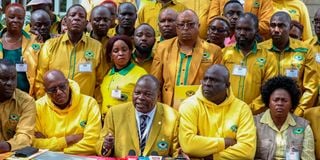
Kuppet Secretary-General Akelo Misori addresses the media flanked by other officials in Nairobi on August 25, 2024.
“As Secretary General, I must show leadership. Even if a decision is unpopular, it is better to make one than to make none at all. In any case, I am the one mandated by the union constitution to make these decisions. It should be clear that not everyone has authority to issue a strike notice” Mr Misori stated.
Former President Daniel Moi, a teacher by profession, played a leading role in the registration of Knut when, as a member of the Legislative Council (Legco) representing the Rift Valley, he moved a motion for the formation of a union in 1957.
Before the recognition of a trade union, African leaders had suffered much humiliation at the hands of their European and Asian counterparts who enjoyed better working conditions and terms of service.
Mr Moi's action gave birth to Knut, which was registered on May 14, 1959, but at the end of his presidency, after coming to power in 1978, he clashed with union officials over demands for improved conditions of service.
But a clash with President Moi over the week-long strike on October 1, 1998, saw Mr Adongo forced to apologise to the government when it failed to implement the 150-200 per cent pay rise for teachers promised in the run-up to the 1997 general election.
In a fit of public anger, Mr Moi called Mr Adongo 'a fool who does not care about the welfare of children and teachers in this country'.
In a rare move, Knut and TSC officials were flown in a military helicopter to Kabarak shortly afterwards, where a deal was struck, with President Moi ordering that the first phase of the Collective Bargaining Agreement (CBA) be paid.
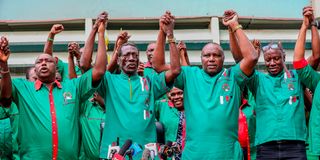
Knut officials address journalists at the Union’s headquarters in Nairobi on August 25, 2024 .
Finance Minister Simeon Nyachae later put the brakes on implementation, leading to a month-long strike, forcing Mr Moi to intervene again with assurances that the deal would be honoured as teachers reluctantly took him at his word.
During President Mwai Kibaki's Narc administration, teachers agitated for the implementation of the remaining four phases, forcing then Labour Minister Joseph Ngutu to intervene.
Joseph Kinyua, the then Treasury permanent secretary, ordered that the increment be spread over 10 years, but Education minister George Saitoti later reduced it to five years, which was completed in 2007.
"The perennial battle between TSC and KNUT is that of a child turning against a parent because without the union, the commission would probably not exist today," said Oyuu.
The first teachers' strike in 1963 set the stage for a major one in 1966 that rocked the government of former President Jomo Kenyatta.
The pressure led to the establishment of the Teachers Service Commission (TSC) by an Act of Parliament. The then Minister of Education, Jeremiah Nyaga, published a bill that created the TSC Act (1966), which came into force in 1967.
The 1966 strikes ended the union career of KNUT president Job Rob, who was believed to have struck a deal with the government to call off the strike in exchange for his appointment as principal of Mosoriot Teachers College.
Mr Adongo, remembered as a man with a thunderous voice who commanded respect, led Knut for 31 years before passing away on 1 March 2001. He was revered by the teachers.
But before him there was Joseph Kioni, the founding general secretary of the union after its formation at the Pumwani Conference in December 1957, who was disgraced, arrested and imprisoned as part of the state's machinations against teachers.
Mr Kioni, the first general secretary of Knut, was imprisoned on what are believed to be trumped-up charges after he allegedly deposited Sh5,000 he collected at the Muranga branch into his personal account instead of handing it over to the union treasurer, Isaac Nzioka.
Mr Nzioka, believed to have been acting at the behest of state agencies, reported the matter to the Criminal Investigations Department (CID) arm of the police claiming Mr Kioni had stolen the money.
As a result, Mr Kioni was charged with theft and subsequently jailed for nine months, effectively ending his career in the union.
Mr Kioni, who was a tutor at Kilimambogo Teachers College, later tried in vain to reclaim the post from Mr Adongo, who had taken over in 1970, after serving his prison sentence.
Mr Adongo remained General Secretary until his death on March 1, 2001, marking the end of an era, and was succeeded by Mr Farncis Nganga, a respected teacher and trade unionist.
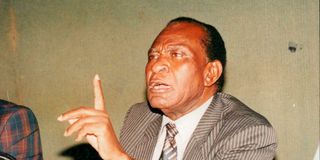
Former Knut Secretary-General Ambrose Adeya Adongo.
The TSC has always played a game of cat and mouse with the teachers' unions, playing them off against each other and dealing with them in silos even when the issues are the same, a tactic that was used in the recent industrial dispute.
While Knut and Kuppet announced together that they would pursue the issues to the end, they soon went their separate ways, reading from different scripts. Similar scenarios have played out in the past when it was a question of who would blink first.
On August 25, 2024, Kuppet announced that it would go ahead with the strike, while a few hours later Knut announced that it had withdrawn the strike notice and that its members would return to work because the issues raised had been resolved.
Kuppet's highest decision-making body - the National Governing Council (NGC) - voted to continue the strike for the second week in a row, but the National Executive Board (NEB) reversed itself a day later and suspended the strike.
The biggest battle between the TSC and the teachers' unions was in 2015, when the commission offered a 35 per cent salary increase, but Knut under former Mr Sossion and Mudzo Nzili (chairman) insisted on 50-60 per cent as an irreducible minimum.
The matter ended up in court, the teachers won the fight, but the money was not factored into their pay slips to date.
The government took the opportunity to crack down on the unions, starving them of funds by failing to deduct and remit their members' monthly dues.
Kuppet and Knut were literally brought to their knees in a campaign that began after a dispute with TSC in 2017 following the non-implementation of the 2016 CBA.
It resulted in the non-deduction and remittance of dues for 24 months, which saw Knut's membership drop from 187,000 to 12,000, bringing it to its knees financially as its revenue dropped from Sh147 million to Sh11 million per month.
A decision by Kuppet under Mr Misori to mend fences with the TSC led to the release of membership fees by the commission and an increase in membership as Knut under Sossion limped on and eventually paid the price.
Knut is still recovering from the negative economic impact that saw national and branch officials, workers and suppliers go without pay for two years, with many officials succumbing to depression and others quitting their jobs altogether.
Landlords evicted branch officials from their offices, property including buses and furniture was auctioned off, and loans for workers and officials were recalled by financial institutions.
"In 2021, most branch officials were re-elected unopposed, not because of a lack of competition, but because the positions were no longer attractive due to the union's lack of funds and the uncertainty of their careers," said Alice Bor, a member of Knut's National Executive Council (NEC).
Kuppet officials are embroiled in a dispute over the National Executive Board (NEB) calling off the strike, bypassing the National Governing Council (NGC), the top decision-making body.
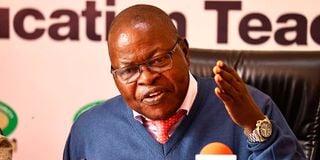
Kenya Union of Post Primary Education Teachers (Kuppet) Secretary-General Akello Misori.
Mr Misori alluded to the rift and called for a truce, two days after he wrote to officials in an internal memo saying those upset by the decision should wait for the NGC to be convened so they can air their grievances.
“We have a few leaders who are claiming they were not informed of the meeting resolutions. I was shocked by that since we have a channel of communication and the issues which we used to go on strike were addressed” Mr Misori said in Mombasa.
Behind the scenes, the government in divide-and-rule tactics, arm-twisted the Kuppet top guns into bowing to pressure by TSC to call off the strike that was threatening to lead to closure of secondary schools with some institutions having released their children to go home.
On Wednesday, September 4, Kuppet and TSC deposited in court the document they signed bringing the strike that started on August 26, 2024, to an end. The parties also withdrew the suits and counter-suits they had filed in court.
Dr Nancy Macharia, the face of TSC has come under attack for allegedly being a stumbling block in implementation of teachers’ salary increments.
“The commission is pleased to confirm that the government has provided funds for implementation of the second phase of the CBA with effect from July 1, 2024” Dr Macharia stated.
“The government has successfully implemented all the provisions of 2021-2025 CBA with the teacher unions. The second phase of the CBA, which was due on July 1, 2024, was duly paid in August 2024 together with arrears” Dr Macharia stated.
She stated that the review of the Career Progression Guidelines (CPG) has begun, remittance of third-party deductions has been resolved, medical scheme funding has been restored and teachers can now access both public and private hospitals under the new scheme.


